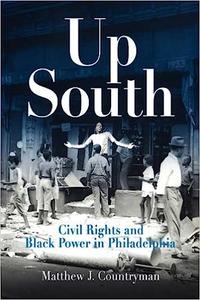
Free Download Matthew J. Countryman, "Up South: Civil Rights and Black Power in Philadelphia"
English | 2007 | pages: 434 | ISBN: 0812220021, 081223894X | PDF | 61,1 mb
Up South traces the efforts of two generations of black Philadelphians to turn the City of Brotherly Love into a place of promise and opportunity for all. Although Philadelphia rarely appears in histories of the modern civil rights struggle, the city was home to a vibrant and groundbreaking movement for racial justice in the years between World War II and the 1970s. By broadening the chronological and geographic parameters of the civil rights movement, Up South explores the origins of civil rights liberalism, the failure of the liberal program of antidiscrimination legislation and interracial coalition-building to deliver on its promise of racial equality, and the subsequent rise of the Black Power movement.
The Philadelphia movement occurred in three stages. During the 1940s and 1950s, liberal civil rights groups in the city successfully campaigned for Philadelphia's new City Charter to be the first in the nation to include a ban on racial discrimination in municipal employment, services, and contracts. Within a decade, however, black activists in the city were leading consumer boycotts and street protests against the city's liberal establishment for failing to overcome entrenched structures of racial inequality in labor markets, residential neighborhoods, and public schools. These protests set the stage both for some of the earliest experiments in affirmative action and for the emergence of the Black Power movement in Philadelphia.
Challenging the view that it was the inflammatory rhetoric of Black Power and the rising demands of black activists that derailed the civil rights movement, Up South documents the efforts of Black Power activists in Philadelphia to construct a vital and effective social movement that combined black nationalism's analysis of racism's constitutive role in American society with a program of grassroots community organizing and empowerment. On issues ranging from public education and urban renewal to police brutality and welfare, Philadelphia's Black Power movement remade the city's political landscape. And, in contrast to the top-down middle-class leadership of traditional civil rights groups, Black Power in Philadelphia fundamentally altered the composition of black leadership in the city to include a new cohort of neighborhood-based working-class and female black community activists.
Up South Civil Rights and Black Power in Philadelphia Torrent Download , Up South Civil Rights and Black Power in Philadelphia Watch Free Link , Up South Civil Rights and Black Power in Philadelphia Read Free Online , Up South Civil Rights and Black Power in Philadelphia Download Online
